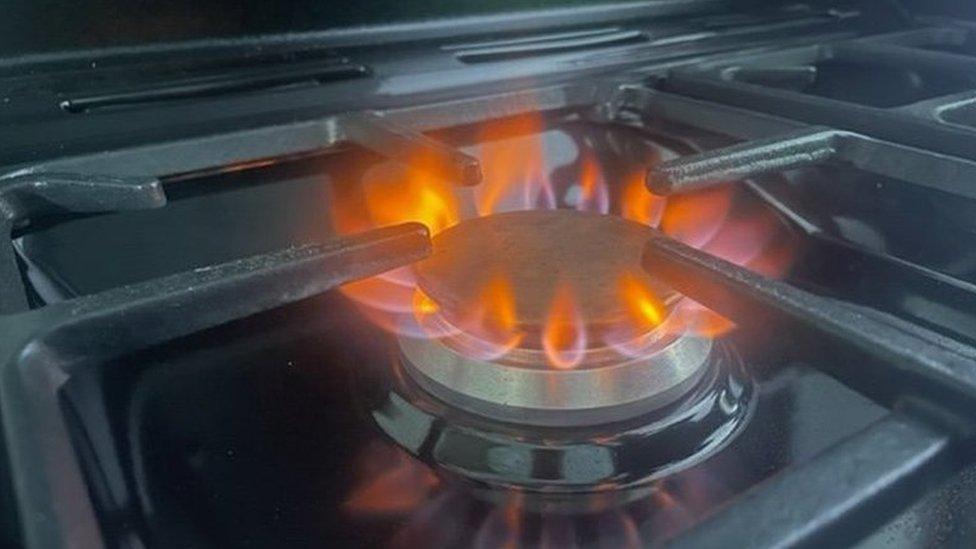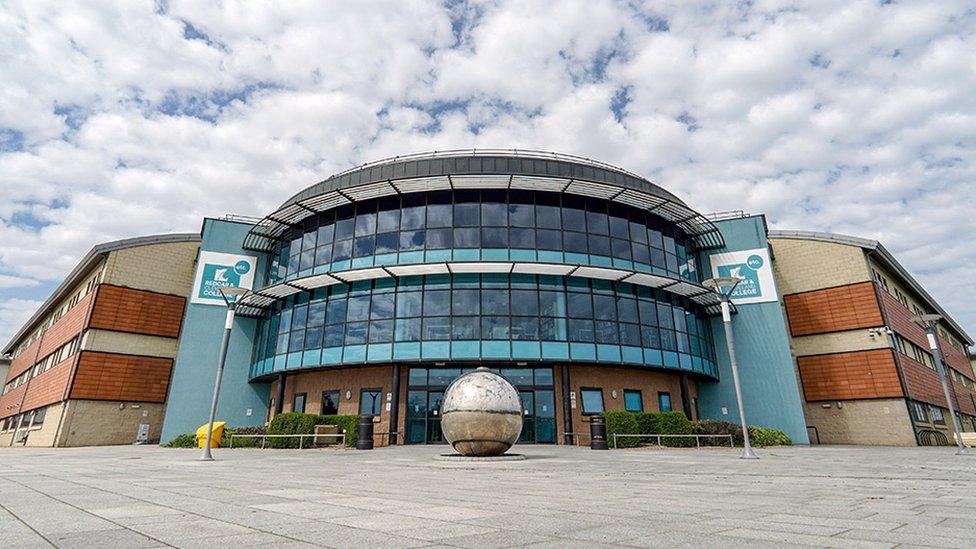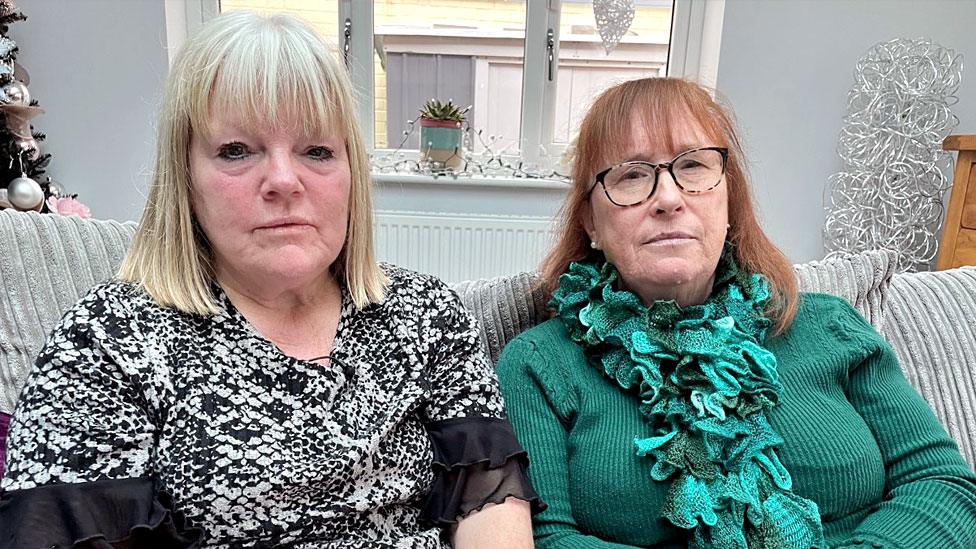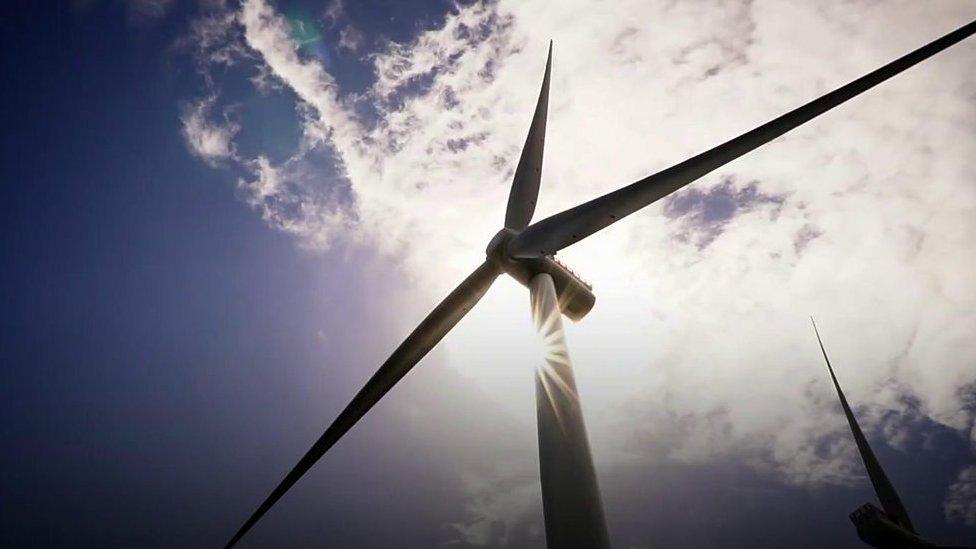Redcar hydrogen home energy project's safety questioned
- Published

Hydrogen cookers and fires are still at the prototype stage
Concerns are being raised about the safety of a pilot project to replace home gas supplies with hydrogen.
Redcar on Teesside and Whitby in Ellesmere Port are bidding to host the trial to be chosen later this year.
Steve Rudd, who lives in Redcar, said hydrogen was "inherently unsafe" but homeowners cannot opt out of the pilot.
But Northern Gas Networks (NGN), which is submitting the North East's bid, said the scheme would not go ahead unless safety issues were addressed.
Residents are worried hydrogen is more explosive and produces more harmful nitrogen oxide (NOx) than the currently supplied natural gas.
Mr Rudd complained NGN had been "very evasive" and residents were being asked to make a decision with limited information.
But NGN said its five years' research into the safety of converting to hydrogen was being assessed by the Health and Safety Executive (HSE).
Hydrogen programme director Tim Harwood said: "Without a sign-off from the HSE then the trials won't go ahead."
Mr Harwood said he understood residents' frustrations but the firm could not answer questions about safety until the research was approved.

Tim Harwood said the move from fossil fuels "had to start somewhere"
The government wants to phase out natural gas boilers by 2035, as homes account for about 17% of the UK's greenhouse gas emissions.
Although hydrogen is more combustible, and leakier than natural gas, energy firms say it can be made safe.
Its eco-credentials have also been questioned, given it is currently mostly produced using fossil fuels and even if its made using renewable electricity, results in less energy than just using the electricity itself.
Residents opposed to the pilots in both Redcar and Whitby have raised concerns the companies running them have a vested interest in perpetuating the distribution of a gas through their network, something NGN denies.
Mr Rudd said he had a "basic human right to choose" but could not choose not to take part.
He said: "Effectively, if we didn't choose to come on board, they are going to cut off our ordinary gas."

NGN said Redcar and Cleveland College would become the first college to use 100% hydrogen if the pilot went ahead
NGN said the pilot, if approved, would mean the whole network being converted so allowing individual homes to remain on natural gas was not possible.
It would provide electric alternatives for free for homeowners who did not want hydrogen at all, it said.
But the current consultation had "around a 90% acceptance" so far, Mr Harwood added.
"I do understand people feeling like they don't have a choice but we do have to start somewhere," he said.
Mr Rudd is concerned by research suggesting hydrogen's higher NOx emission levels would need increased ventilation meaning large vents at ceiling height and increased space for airflow under doors.
After business secretary Grant Shapps released a video, external encouraging the use of draught excluders Mr Rudd wrote to ask him "whether we could do the same with our door gaps or would it put us in danger of fumes from NOx".
Allow X content?
This article contains content provided by X. We ask for your permission before anything is loaded, as they may be using cookies and other technologies. You may want to read X’s cookie policy, external and privacy policy, external before accepting. To view this content choose ‘accept and continue’.
He says he got no reply.
Mr Harwood said work was being carried out to make sure NOx levels would be lower than with natural gas, but NGN wanted to use "smart" solutions.
Although increased ventilation was one option, the firm felt this was "counter-intuitive to the things that are happening at the moment in the energy crisis" and it was not one it wanted to pursue.
"We don't want to drill holes in people's walls... or doors," he said.
The bids are due to be submitted by the end of March and either Redcar or Whitby will be chosen to host the pilot by the Department for Business, Energy and Industrial Strategy (BEIS) in the summer.
BEIS was "really clear that they need a steer from the HSE to say that this trial is going to be safe", Mr Harwood said.
"If they don't get that then they won't be going ahead with it."

Follow BBC North East & Cumbria on Twitter, external, Facebook, external and Instagram, external. Send your story ideas to northeastandcumbria@bbc.co.uk, external.
Related topics
- Published4 November 2021

- Published22 December 2022

- Published28 September 2022
